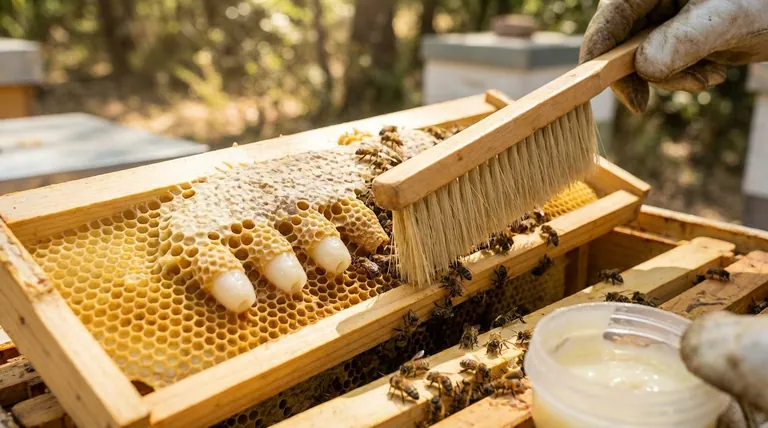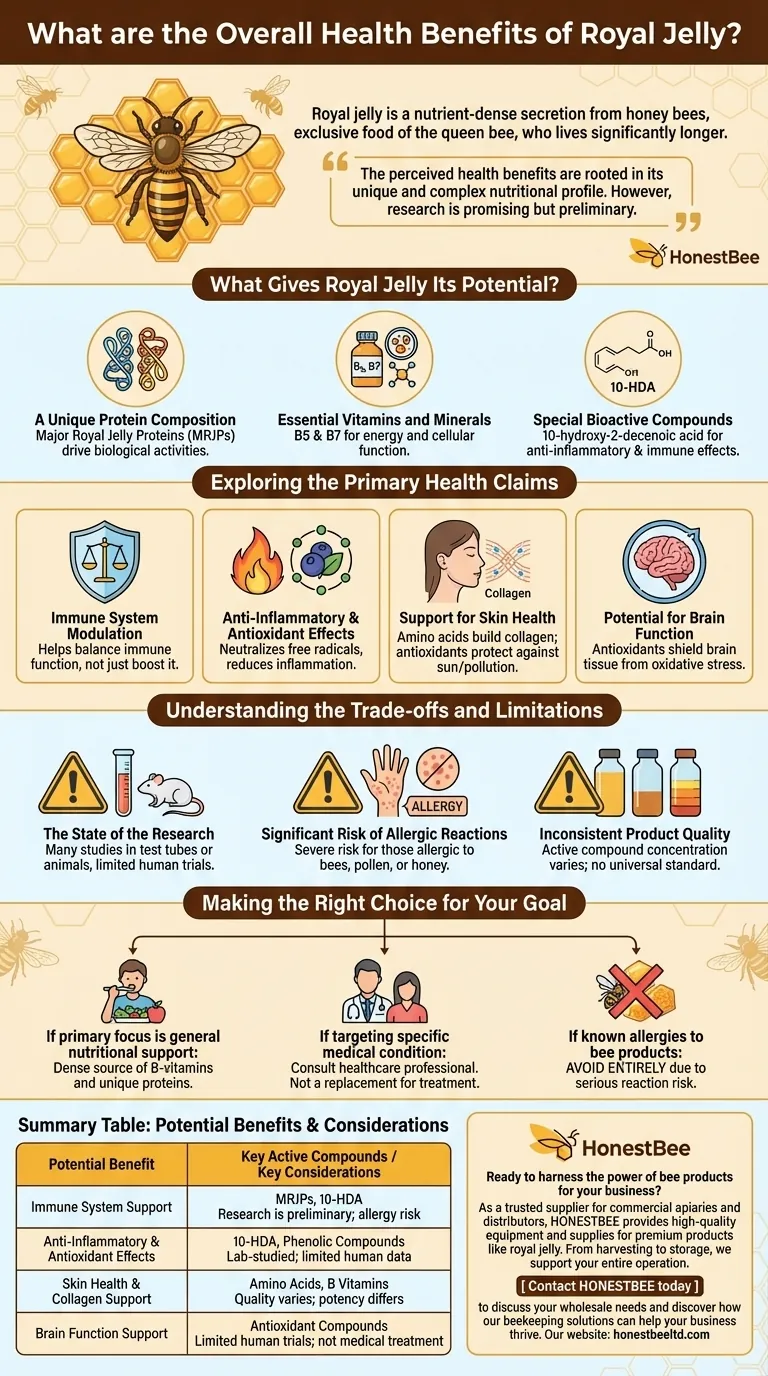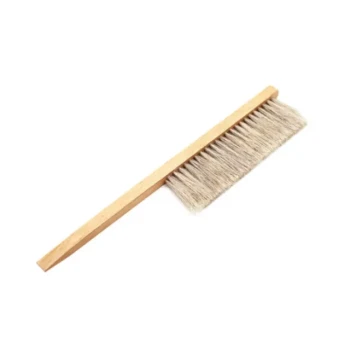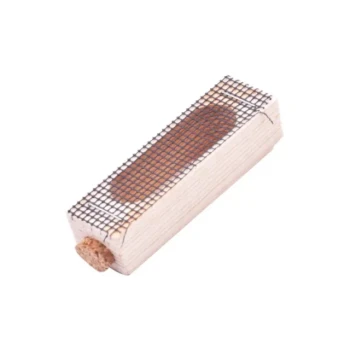Royal jelly is a nutrient-dense secretion from honey bees that is often associated with a wide range of potential health benefits. These primarily include boosting the immune system, reducing inflammation, improving skin health by supporting collagen production, and potentially enhancing brain function due to its antioxidant properties.
The perceived health benefits of royal jelly are rooted in its unique and complex nutritional profile. However, while research is promising, much of the evidence is still preliminary, and it's essential to understand its limitations and potential risks before considering it a solution for specific health conditions.

What Gives Royal Jelly Its Potential?
Royal jelly's reputation stems from its role in the hive—it is the exclusive food of the queen bee, who lives significantly longer than other bees. This distinction is due to its rich composition.
A Unique Protein Composition
The most notable components are the Major Royal Jelly Proteins (MRJPs). These proteins are believed to be the primary drivers behind many of its biological activities.
Essential Vitamins and Minerals
Royal jelly contains a spectrum of B vitamins, including pantothenic acid (B5) and biotin (B7). These vitamins are crucial for converting food into energy and maintaining healthy cellular function.
Special Bioactive Compounds
It contains a unique fatty acid called 10-hydroxy-2-decenoic acid (10-HDA), which is not found in other natural products. This compound is frequently the focus of research into royal jelly's anti-inflammatory and immune-modulating effects.
Exploring the Primary Health Claims
While many claims are made about royal jelly, several areas have received the most scientific attention. It's important to view these as areas of potential, not proven certainties.
Immune System Modulation
The proteins and fatty acids in royal jelly may help regulate the body's immune response. Rather than simply "boosting" it, they appear to help balance immune function, which could be beneficial.
Anti-Inflammatory and Antioxidant Effects
Chronic inflammation and oxidative stress are root causes of many modern ailments. The phenolic compounds and 10-HDA in royal jelly act as antioxidants, helping to neutralize damaging free radicals and reduce inflammation.
Support for Skin Health
The amino acids (the building blocks of protein) in royal jelly are essential for building collagen, the protein that gives skin its structure and elasticity. Its antioxidant properties may also help protect the skin from damage caused by sun exposure and pollution.
Potential for Brain Function
Some preliminary studies suggest that the antioxidant compounds in royal jelly could have a neuroprotective effect. This may help shield brain tissue from oxidative stress, a factor in age-related cognitive decline.
Understanding the Trade-offs and Limitations
Objectivity is critical when evaluating any supplement. Royal jelly is not a magic bullet and comes with important considerations.
The State of the Research
Much of the research supporting royal jelly's benefits has been conducted in test tubes or on animals. While these studies are valuable, they don't always translate directly to human health. Large-scale human clinical trials are still limited.
Significant Risk of Allergic Reactions
This is the most critical consideration. Individuals with allergies to bees, bee pollen, or honey are at a high risk of having a serious allergic reaction, which can range from mild itching to life-threatening anaphylaxis.
Inconsistent Product Quality
The concentration of active compounds like 10-HDA can vary widely between products due to processing and storage methods. There is no universal standard, making it difficult to guarantee the potency of any given supplement.
Making the Right Choice for Your Goal
To decide if royal jelly is appropriate for you, it's best to align your expectations with the current evidence.
- If your primary focus is general nutritional support: Royal jelly can be viewed as a dense source of B-vitamins and unique proteins that may complement a healthy diet.
- If you are targeting a specific medical condition: It is crucial to consult with a healthcare professional. Royal jelly should never be used to replace proven medical treatments.
- If you have known allergies to bee products: You must avoid royal jelly entirely due to the serious risk of an allergic reaction.
Ultimately, approaching royal jelly as a potentially supportive nutritional supplement, rather than a miracle cure, is the most informed and responsible way to consider its use.
Summary Table:
| Potential Benefit | Key Active Compounds | Key Considerations |
|---|---|---|
| Immune System Support | Major Royal Jelly Proteins (MRJPs), 10-HDA | Research is preliminary; risk of allergic reactions |
| Anti-Inflammatory & Antioxidant Effects | 10-HDA, Phenolic Compounds | Effects studied more in labs than in humans |
| Skin Health & Collagen Support | Amino Acids, B Vitamins | Quality and potency can vary between products |
| Brain Function Support | Antioxidant Compounds | Limited human clinical trials; not a substitute for medical treatment |
Ready to harness the power of bee products for your business?
As a trusted supplier for commercial apiaries and distributors, HONESTBEE provides the high-quality equipment and supplies you need to produce premium products like royal jelly. From harvesting tools to storage solutions, we support your entire operation.
Contact HONESTBEE today to discuss your wholesale needs and discover how our beekeeping solutions can help your business thrive.
Visual Guide

Related Products
- Wooden Bee Brush with Triple Row Artificial Fiber for Beekeeping
- Wooden Bee Brush with Double-Row Horsehair Bristles
- Honey Wax Separating Wax Press with Metal Screw Wax Separator Machine
- Wood and Mesh Push-In Queen Cage
- Queen Bee Marking Pen UNI Medium Point for Queen and Bee Marking
People Also Ask
- What is the mechanical function of beekeeping cleaning brushes? Prevent Pests and Protect Your Colony's Health
- What is the function of fine brushes in Varroa destructor resistance bioassays? Ensure Precise Research Results
- What is the purpose of a bee brush? Gently Manage Your Hive with Precision
- Why are specialized tools such as Frame Lifters and Bee Brushes considered essential for modern honeybee colony management?
- What are the specific functions of hive tools and bee brushes in reducing apiary management costs? Maximize Efficiency



















